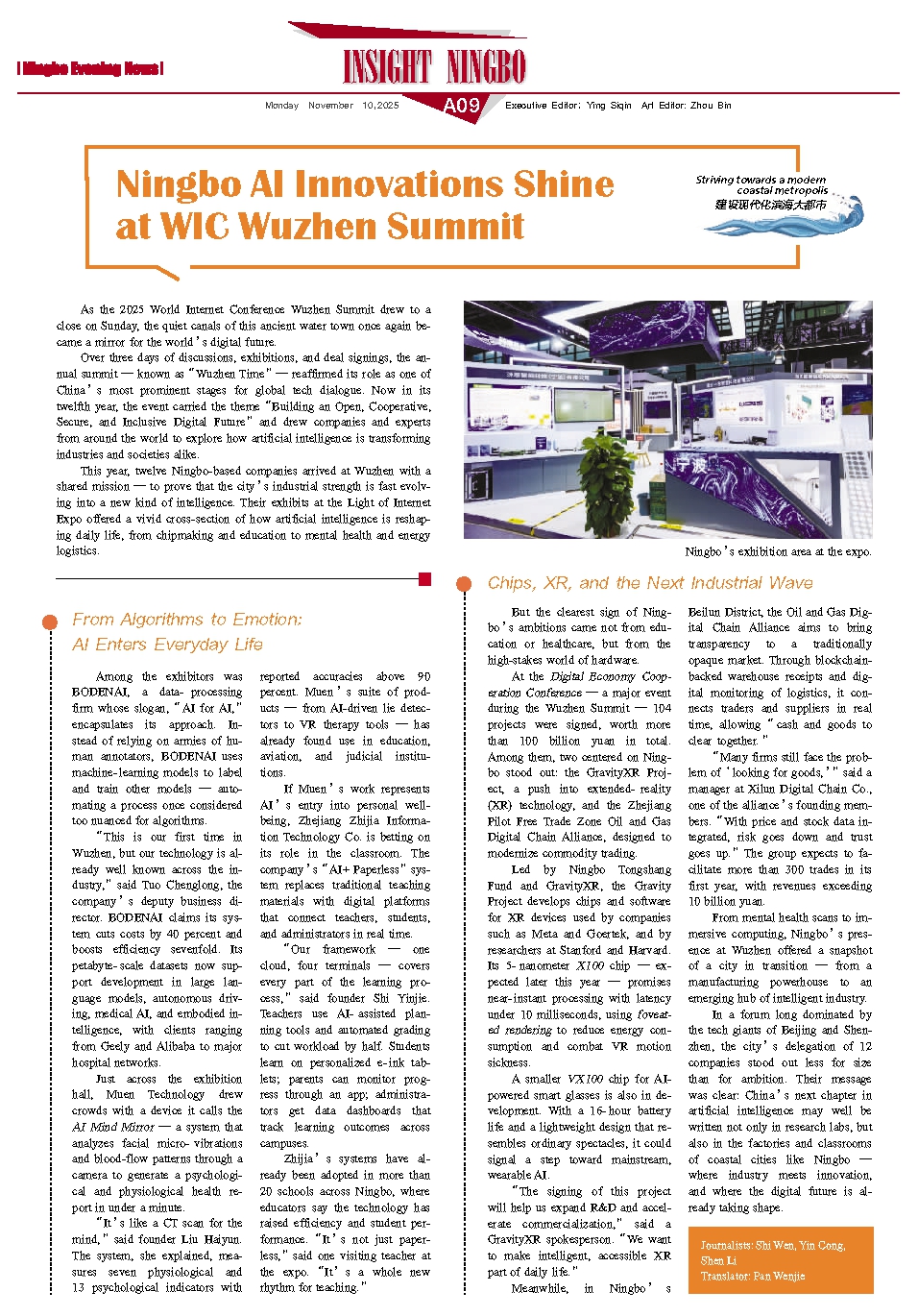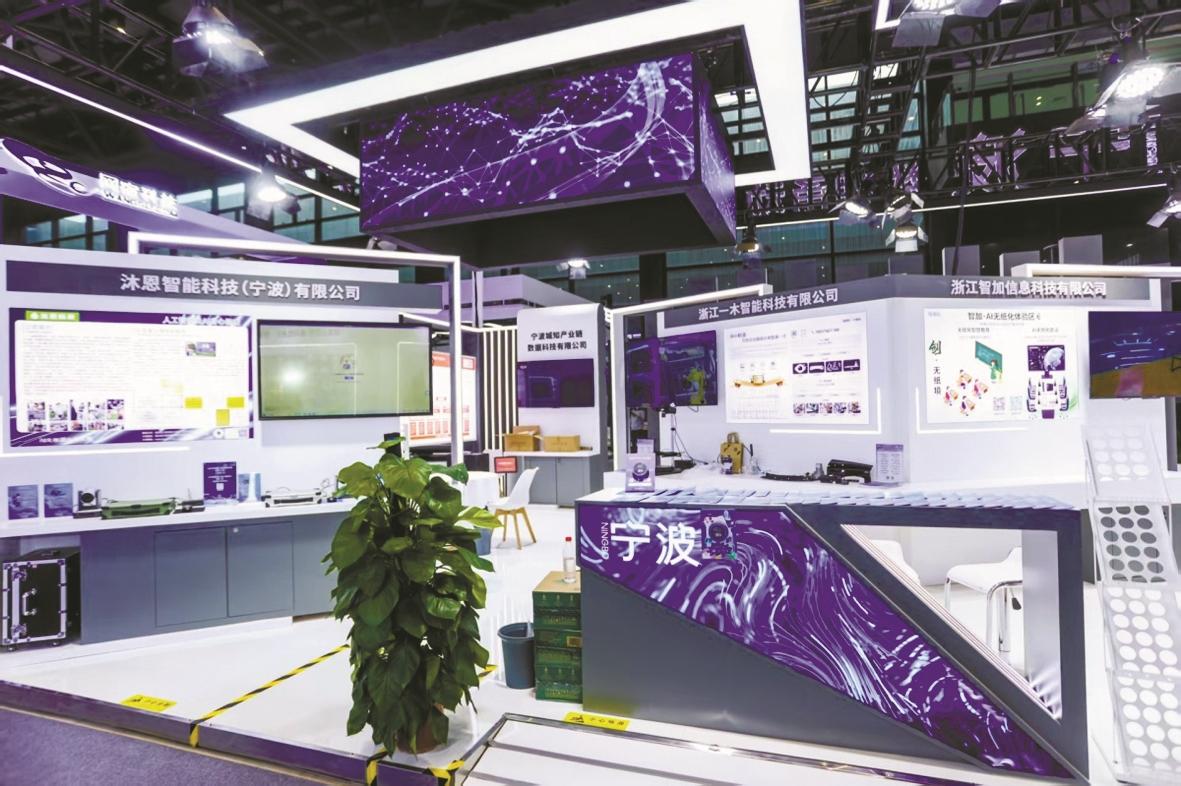As the 2025 World Internet Conference Wuzhen Summit drew to a close on Sunday, the quiet canals of this ancient water town once again became a mirror for the world’s digital future.
Over three days of discussions, exhibitions, and deal signings, the annual summit — known as “Wuzhen Time” — reaffirmed its role as one of China’s most prominent stages for global tech dialogue. Now in its twelfth year, the event carried the theme “Building an Open, Cooperative, Secure, and Inclusive Digital Future” and drew companies and experts from around the world to explore how artificial intelligence is transforming industries and societies alike.
This year, twelve Ningbo-based companies arrived at Wuzhen with a shared mission — to prove that the city’s industrial strength is fast evolving into a new kind of intelligence. Their exhibits at the Light of Internet Expo offered a vivid cross-section of how artificial intelligence is reshaping daily life, from chipmaking and education to mental health and energy logistics.
From Algorithms to Emotion:
AI Enters Everyday Life
Among the exhibitors was BODENAI, a data-processing firm whose slogan, “AI for AI,” encapsulates its approach. Instead of relying on armies of human annotators, BODENAI uses machine-learning models to label and train other models — automating a process once considered too nuanced for algorithms.
“This is our first time in Wuzhen, but our technology is already well known across the industry,” said Tuo Chenglong, the company’s deputy business director. BODENAI claims its system cuts costs by 40 percent and boosts efficiency sevenfold. Its petabyte-scale datasets now support development in large language models, autonomous driving, medical AI, and embodied intelligence, with clients ranging from Geely and Alibaba to major hospital networks.
Just across the exhibition hall, Muen Technology drew crowds with a device it calls the AI Mind Mirror — a system that analyzes facial micro-vibrations and blood-flow patterns through a camera to generate a psychological and physiological health report in under a minute.
“It’s like a CT scan for the mind,” said founder Liu Haiyun. The system, she explained, measures seven physiological and 13 psychological indicators with reported accuracies above 90 percent. Muen’s suite of products — from AI-driven lie detectors to VR therapy tools — has already found use in education, aviation, and judicial institutions.
If Muen’s work represents AI’s entry into personal well-being, Zhejiang Zhijia Information Technology Co. is betting on its role in the classroom. The company’s “AI+ Paperless” system replaces traditional teaching materials with digital platforms that connect teachers, students, and administrators in real time.
“Our framework — one cloud, four terminals — covers every part of the learning process,” said founder Shi Yinjie. Teachers use AI-assisted planning tools and automated grading to cut workload by half. Students learn on personalized e-ink tablets; parents can monitor progress through an app; administrators get data dashboards that track learning outcomes across campuses.
Zhijia’s systems have already been adopted in more than 20 schools across Ningbo, where educators say the technology has raised efficiency and student performance. “It’s not just paperless,” said one visiting teacher at the expo. “It’s a whole new rhythm for teaching.”
Chips, XR, and the Next Industrial Wave
But the clearest sign of Ningbo’s ambitions came not from education or healthcare, but from the high-stakes world of hardware.
At the Digital Economy Cooperation Conference — a major event during the Wuzhen Summit — 104 projects were signed, worth more than 100 billion yuan in total. Among them, two centered on Ningbo stood out: the GravityXR Project, a push into extended-reality (XR) technology, and the Zhejiang Pilot Free Trade Zone Oil and Gas Digital Chain Alliance, designed to modernize commodity trading.
Led by Ningbo Tongshang Fund and GravityXR, the Gravity Project develops chips and software for XR devices used by companies such as Meta and Goertek, and by researchers at Stanford and Harvard. Its 5-nanometer X100 chip — expected later this year — promises near-instant processing with latency under 10 milliseconds, using foveated rendering to reduce energy consumption and combat VR motion sickness.
A smaller VX100 chip for AI-powered smart glasses is also in development. With a 16-hour battery life and a lightweight design that resembles ordinary spectacles, it could signal a step toward mainstream, wearable AI.
“The signing of this project will help us expand R&D and accelerate commercialization,” said a GravityXR spokesperson. “We want to make intelligent, accessible XR part of daily life.”
Meanwhile, in Ningbo’s Beilun District, the Oil and Gas Digital Chain Alliance aims to bring transparency to a traditionally opaque market. Through blockchain-backed warehouse receipts and digital monitoring of logistics, it connects traders and suppliers in real time, allowing “cash and goods to clear together.”
“Many firms still face the problem of ‘looking for goods,’” said a manager at Xilun Digital Chain Co., one of the alliance’s founding members. “With price and stock data integrated, risk goes down and trust goes up.” The group expects to facilitate more than 300 trades in its first year, with revenues exceeding 10 billion yuan.
From mental health scans to immersive computing, Ningbo’s presence at Wuzhen offered a snapshot of a city in transition — from a manufacturing powerhouse to an emerging hub of intelligent industry.
In a forum long dominated by the tech giants of Beijing and Shenzhen, the city’s delegation of 12 companies stood out less for size than for ambition. Their message was clear: China’s next chapter in artificial intelligence may well be written not only in research labs, but also in the factories and classrooms of coastal cities like Ningbo — where industry meets innovation, and where the digital future is already taking shape.
Journalists: Shi Wen, Yin Cong,
Shen Li
Translator: Pan Wenjie



